Class 5 Maths Mela Chapter 8 Weight and Capacity NCERT Solutions
Textbook Page 104
Check! Check!
• Anu has recorded the weights of the items in her house. Check if she has recorded them correctly by putting a tick against them if they look correct.
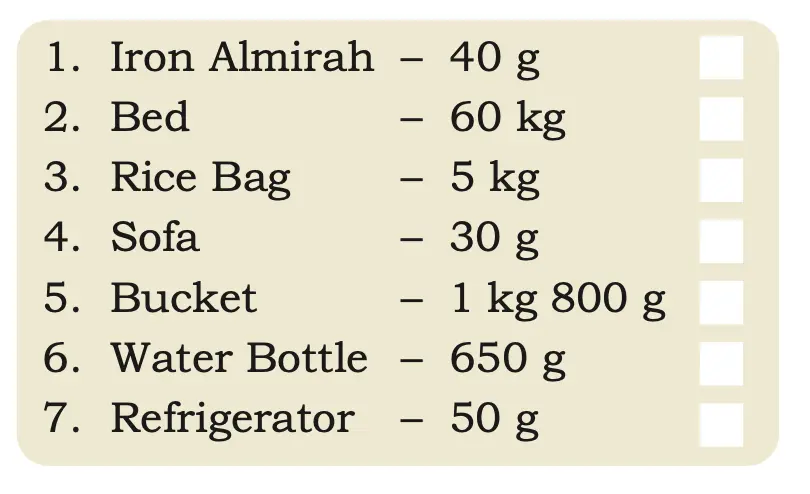
Solution:
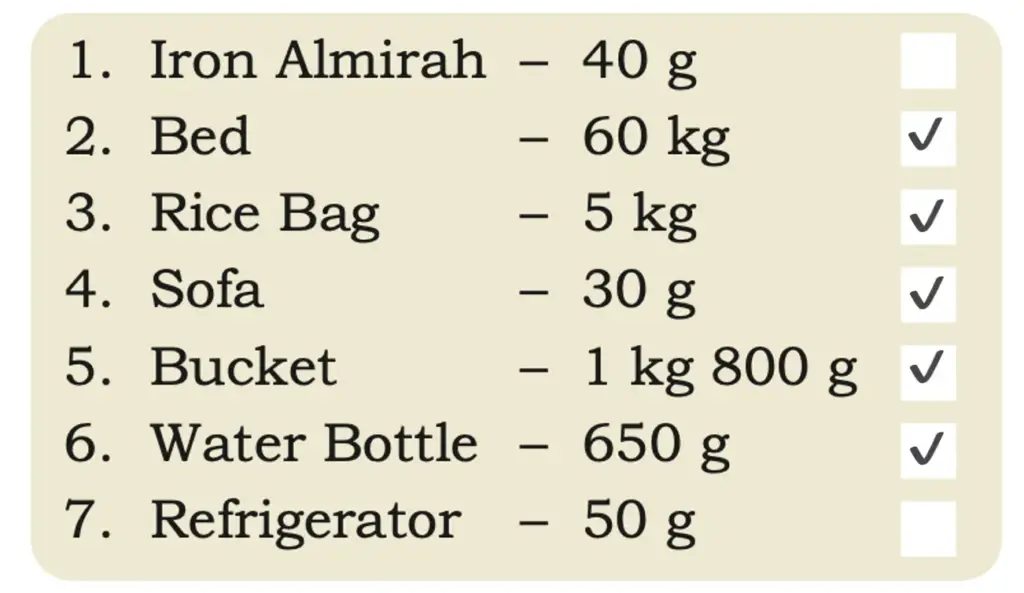
Let Us Do
• Read the scales. Write the correct weight in the space given below.
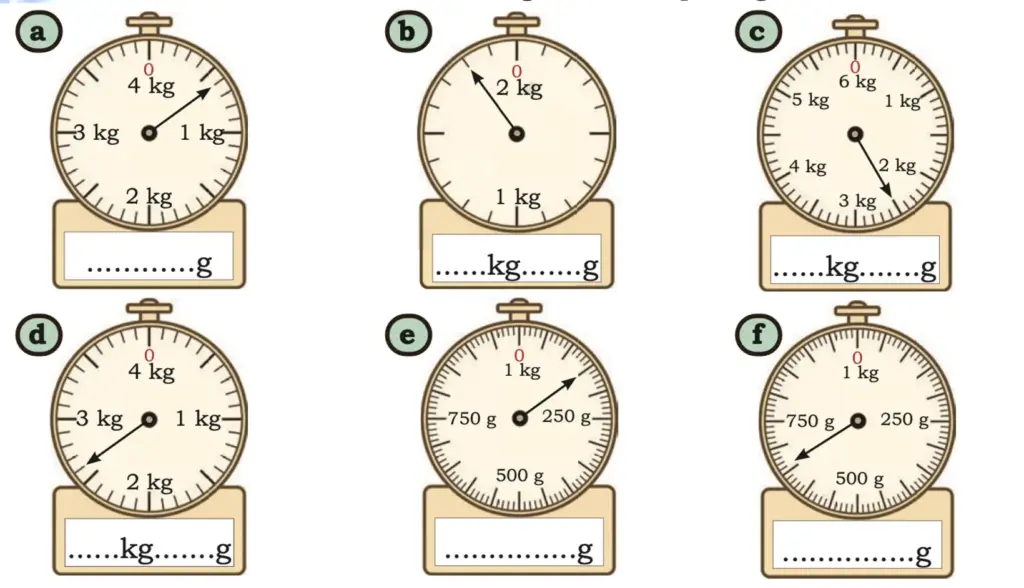
Solution:
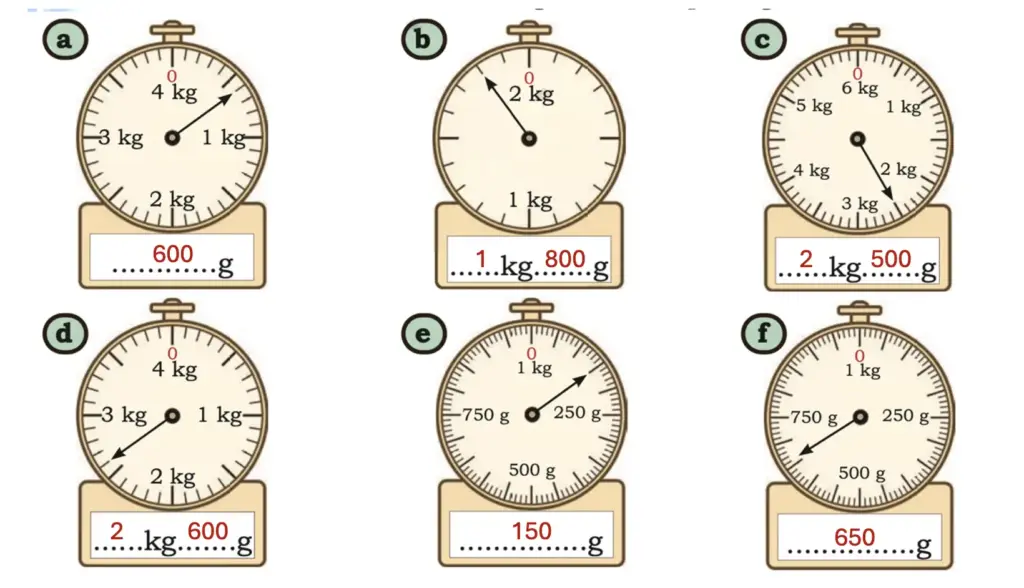
Textbook Page 105
Q.
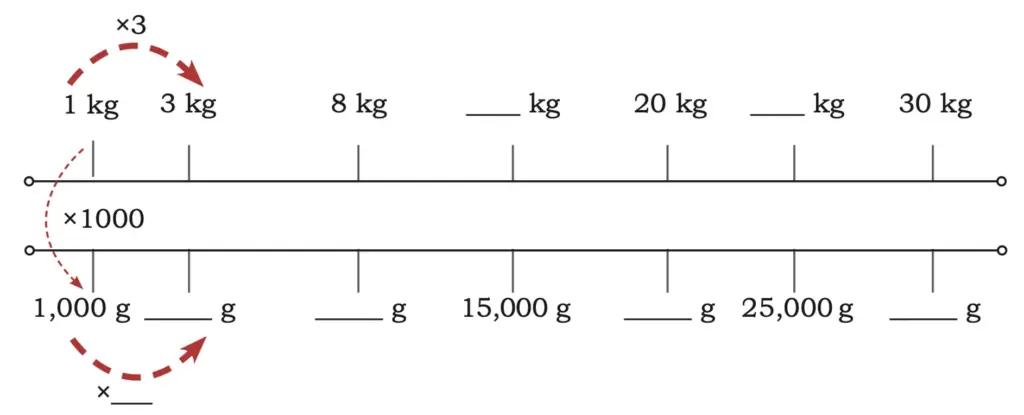
Solution:
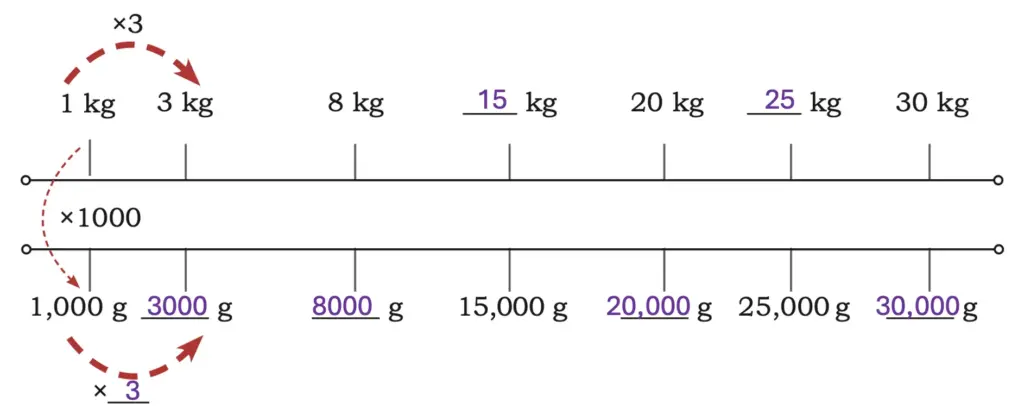
Textbook Page 106
Let Us Find
1. Shamim and Rehan observed someone buying sugar weighing 5 kg 50 g. They thought of the quantity in grams. How much is it?

Solution:
Quantity of sugar = 5 kg 50 g = 5 × 1000 g + 50 g = 5000 g + 50 g = 5050 g.
Since 5 kg 50 g = 5050 g.
So, Shamim’s answer is correct.
2. Complete the conversions by filling in the blanks. You can use the double number line given below on which some numbers have been marked.
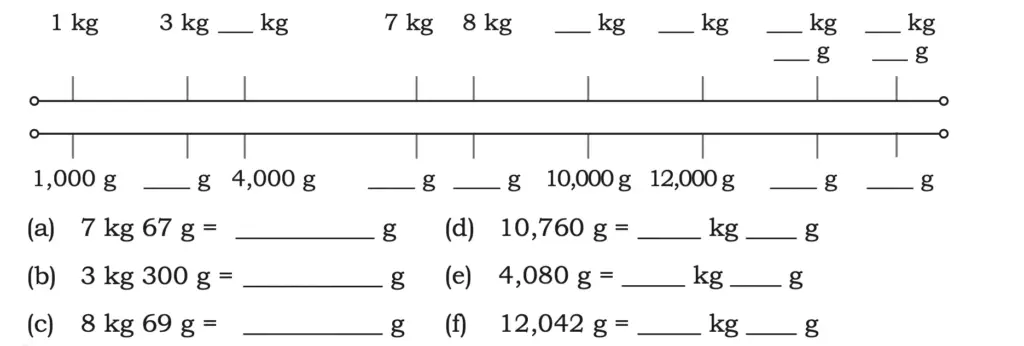
Solution:

(a) 7 kg 67 g = 7 × 1000 g + 67 g = 7000 g + 67 g = 7067 g.
(b) 3 kg 300 g = 3 × 1000 g + 300 g = 3000 g + 300 g = 3300 g.
(c) 8 kg 69 g = 8 × 1000 g + 69 g = 8000 g + 69 g = 8069 g.
(d) 10,760 g = 10,000 g + 760 g = 10 × 1000 g + 760 g = 10 kg 760 g.
(e) 4,080 g = 4,000 g + 80 g = 4 × 1000 g + 80 g = 4 kg 80 g.
(f) 12,042 g = 12,000 g + 42 g = 12 × 1000 g + 42 g = 12 kg + 42 g.
Textbook Page 107
Comparison between Different Weights
1. Harpreet’s family planned a picnic over the weekend. Her mother and father packed different food items to take along. The following is the list of fruits they carried.
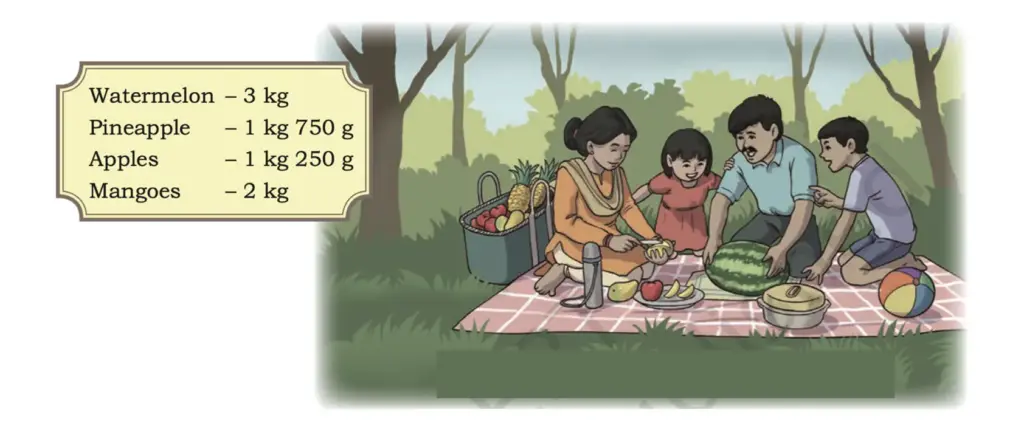
Among the fruits they carried, which one has the
(a) highest weight? __________
(b) least weight? __________
(c) Arrange the items in descending order of their weight. __________ __________ __________ __________
Solution:
(a) Watermelon.
(b) Apples.
(c) Watermelon > Mangoes > Pineapple > Apples.
2. Compare the weights using <, =, > signs.
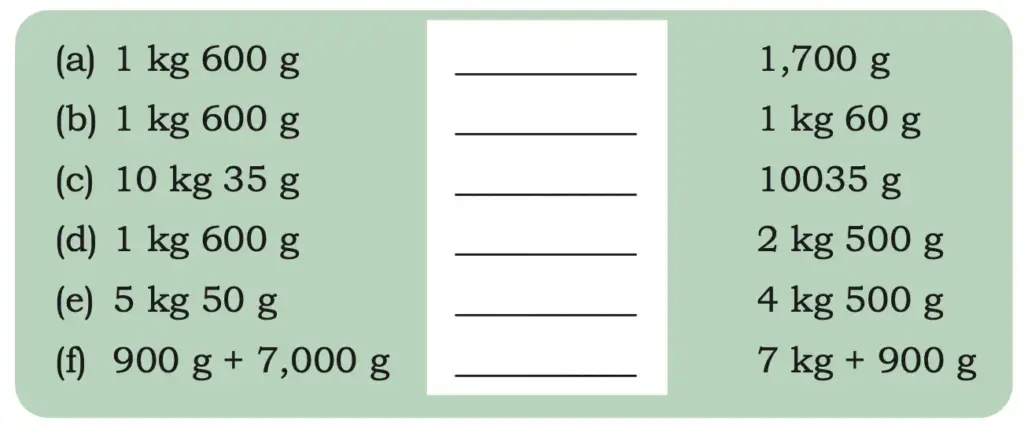
Solution:
(a) 1 kg 600 g ______ 1700 g
1000 g + 600 g ______ 1700 g
1,600 g < 1,700 g.
(b) 1 kg 600 g ______ 1 kg 60 g
1000 g + 600 g ______ 1000 g + 60 g
1,600 g > 1,060 g.
(c) 10 kg 35 g ______ 10035 g
10 × 1000 g + 35 g ______ 10,035 g
10,000 g + 35 g ______ 10,035 g
10,035 g = 10,035 g.
(d) 1 kg 600 g ______ 2 kg 500 g
1000 g + 600 g ______ 2 × 1000 g + 500 g
1,600 g ______ 2,000 g + 500 g
1,600 g < 2,500 g.
(e) 5 kg 50 g ______ 4 kg 500 g
5 × 1000 g + 50 g ______ 4 × 1000 g + 500 g
5000 g + 50 g ______ 4000 g + 500 g
5050 g > 4500 g.
(f) 900 g + 7,000 g ______ 7 kg + 900 g
7,900 g ______ 7 × 1000 g + 900 g
7,900 g ______ 7,000 g + 900 g
7,900 g = 7,900 g.
Textbook Page 108
Let Us Find
1. If a sugar sachet weighs 5g, how much will it be in milligrams?
Solution:
Weight of sugar sachet = 5g = 5 × 1000 mg = 5,000 mg.
2. Complete the double number line below appropriately.

Solution:

3. An ornament weighs 4 g 100 mg. What will be the weight in milligrams?
Solution:
Weight of ornamnent = 4 g 100 mg = 4 × 1000 g + 100 mg = 4000 mg + 100 mg = 4,100 mg.
4. A goldsmith has made an ornament weighing 10 g 500 mg. What will its weight be in milligrams?
Solution:
Weight of ornament = 10 g 500 mg = 10 × 1000 mg + 500 mg = 10,000 mg + 500 mg = 10,500 mg.
Textbook Page 109
5. Compare the weights using <, =, > signs.

Solution:
(a) 20 g ______ 200 mg
20 × 1000 mg ______ 200 mg
20,000 mg > 200 mg.
(b) 16 g 50 mg ______ 50 g 16 mg
16 × 1000 mg + 50 mg ______ 50 × 1000 mg + 16 mg
16,000 mg + 50 mg ______ 50,000 + 16 mg
16,050 mg < 50,016 mg.
(c) 2,010 mg ______ 2 g 100 mg
2,010 mg ______ 2 × 1000 mg + 100 mg
2,010 mg ______ 2000 mg + 100 mg
2,010 mg < 2,100 mg.
(d) 9000 mg ______ 90 g
9,000 mg ______ 90 × 1000 mg
9,000 mg < 90,000 mg.
(e) 5000 g ______ 7,500 g
5,000 g < 7,500 g.
(f) 800 mg + 88 mg ______ 880 mg + 8 mg
888 mg = 888 mg.

6. Observe the pictures given below and fill in the blanks.
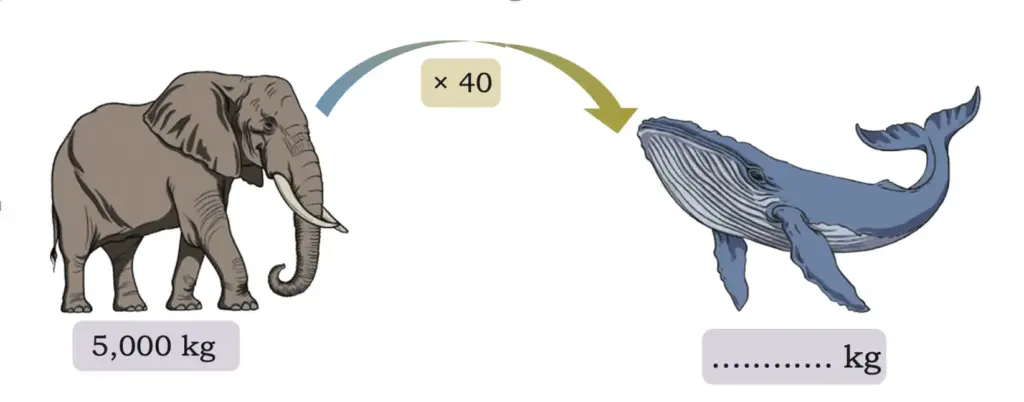
Solution:
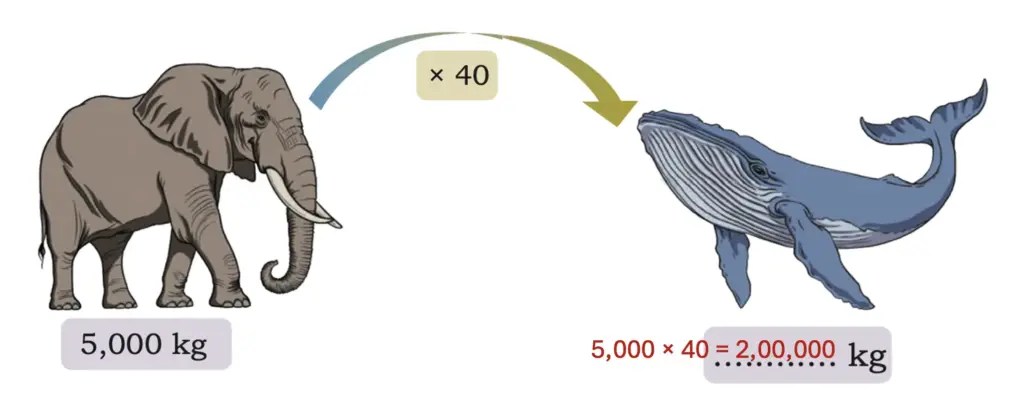
7. Answer the following questions.
(a) 5,000 kg = ______ quintals = _____ tonne
(b) 9,000 kg = _____ quintals
(c) ______ kg = 8 tonnes
Solution:
(a) 5,000 kg = ______ quintals = _____ tonne
5,000 kg = 50 × 100 kg = 50 quintals.
5,000 kg = 5 × 1000 kg = 5 tonnes.
(b) 9,000 kg = _____ quintals
9,000 kg = 90 × 100 kg = 90 quintals.
(c) ______ kg = 8 tonnes
8 tonnes = 8 × 1000 kg = 8000 kg.
King’s Weight
In a kingdom, the king donates wheat grains equal to 10 times his weight on his birthday.
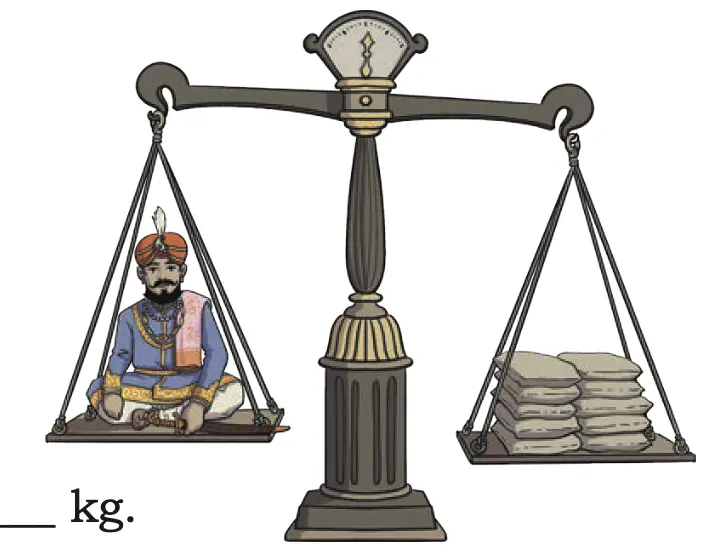
(a) If he donates 800 kg of wheat grain this birthday, what is his current weight? _______ kg.
Solution:
Wheat grains donated on this birthday = 800 kg
King’s current weight on this birthday = 800 ÷ 10 = 80 kg.
(b) If he had donated 780 kg of wheat grain on his last birthday, what was his weight last year? _______ kg.
Solution:
Wheat grains donated on last birthday = 780 kg
King’s weight last year = 780 ÷ 10 = 78 kg.
(c) How much weight did he gain in a year until this birthday?_______ kg
Solution:
The weight gained by the king in a year until this birthday = 80 kg – 78 kg = 2 kg.
Textbook Page 111
Let Us Do
1. A restaurant owner uses 5 kg 200 g, 8 kg 900 g, and 12 kg 600 g of onions over 3 days. What is the total weight of onions used by the restaurant owner in 3 days?
Solution:
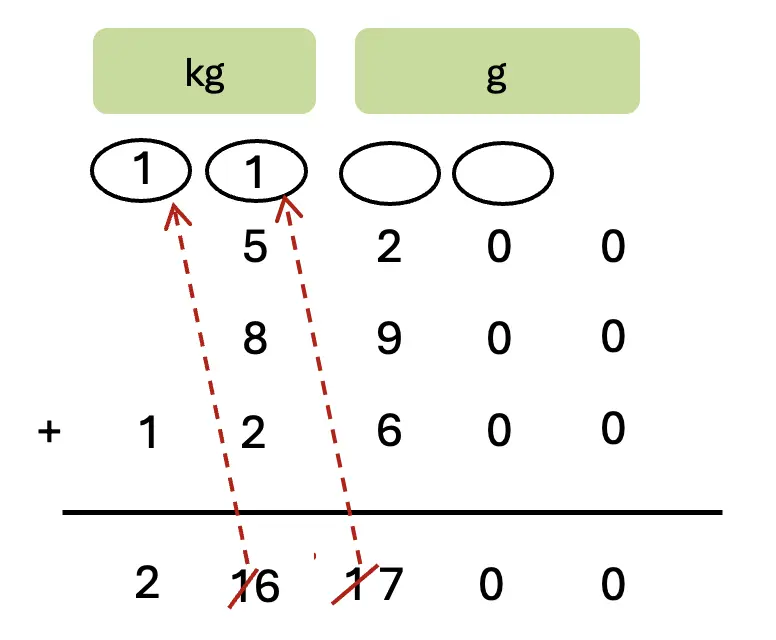
So, the total weight of onions used by the restaurant in 3 days is 26 kg 700 g.
2. Aarav is helping his grandfather at the fruit stall. He lifts two baskets of apples weighing 2 kg 100 g and 3 kg 950 g. What is the total weight of apples he lifted?
Solution:.
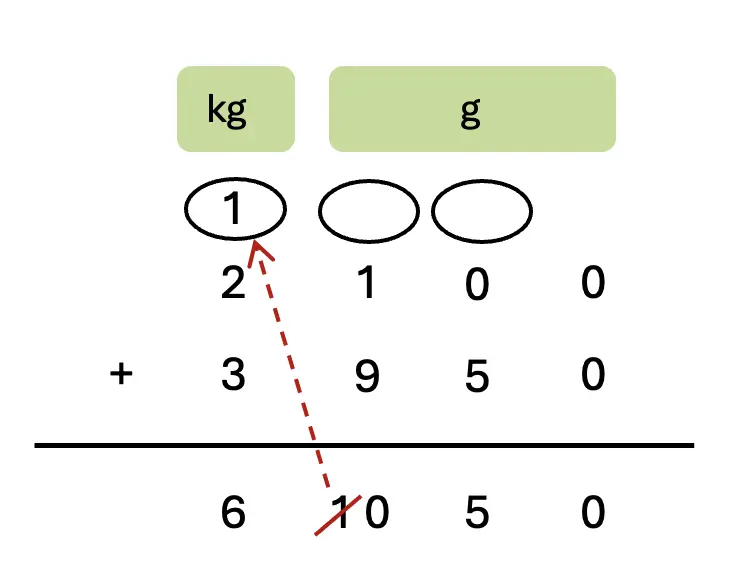
So, the total weight of apples is 6 kg 50 g.
3. 4 kg 500 g of sand is used from a sack weighing 10 kg. How much sand is left in the sack?
Solution:
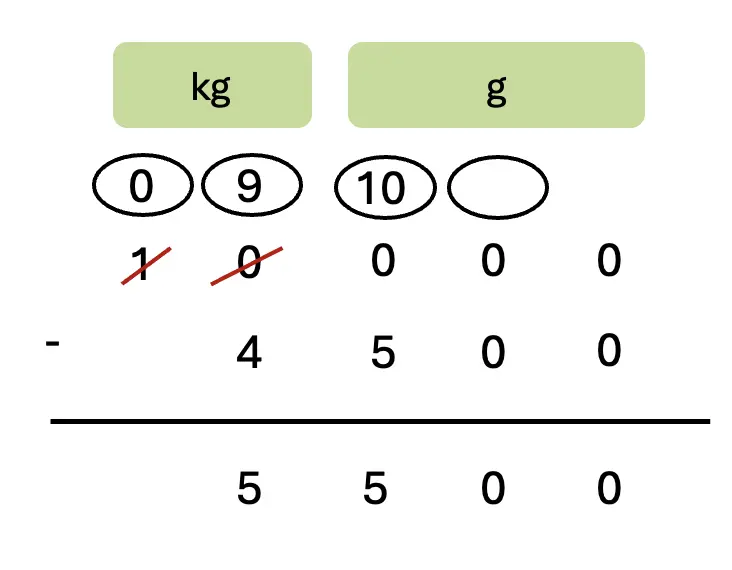
So, the total sand left in the sack is 5 kg 500 g.
4. A rice sack weighs 9 kg 750 g. After some rice is used, it weighs 3 kg 700 g. How much rice was used?
Solution:
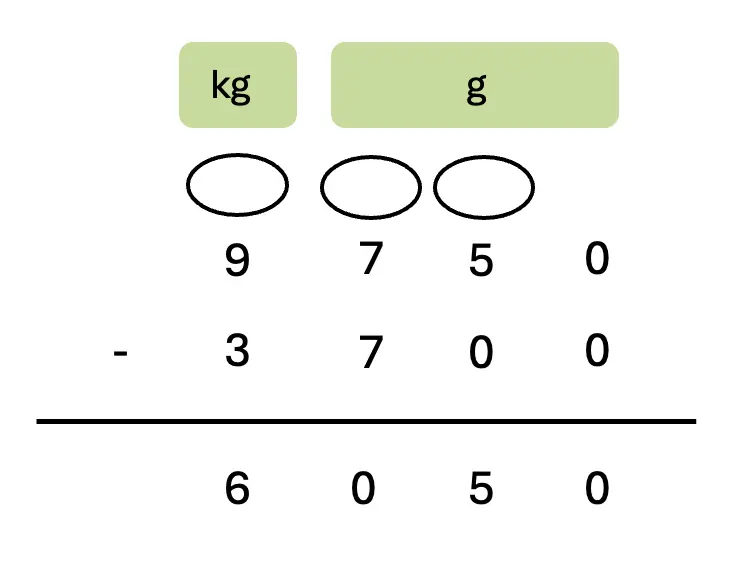
So, the total rice used was 6 kg 50 g.
5. A delivery truck delivered 17 kg 900 g of supplies in the morning and 12 kg 700g in the afternoon. How much total supplies did it deliver?
Solution:
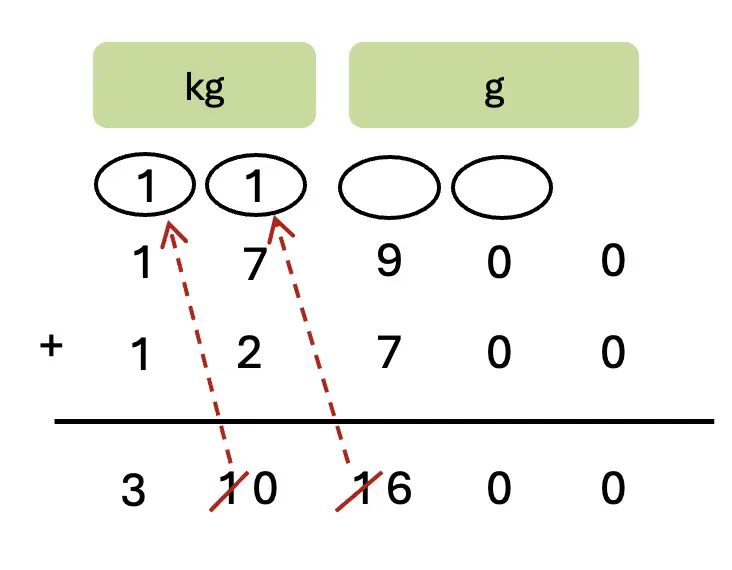
So, the total supplies delivered were 3 kg 600 g.
6. A box of books weighs 14 kg 750 g. After removing some books, the weight of the box is 10 kg 500 g. What is the weight of the books removed?
Solution:
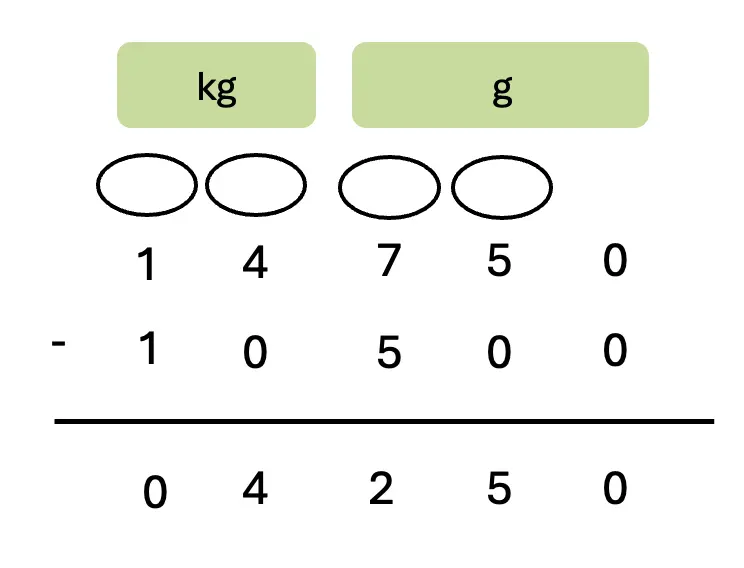
So, the weight of the books removed is 4 kg 250 g.
7. In a community kitchen of a Gurdwara, 65 kg of flour was purchased on one day. Out of this, 42 kg 275 g flour was used for preparing langar. The next day, an additional 52 kg 500 g of flour was bought. What is the total quantity of flour now available in the kitchen store?
Solution:
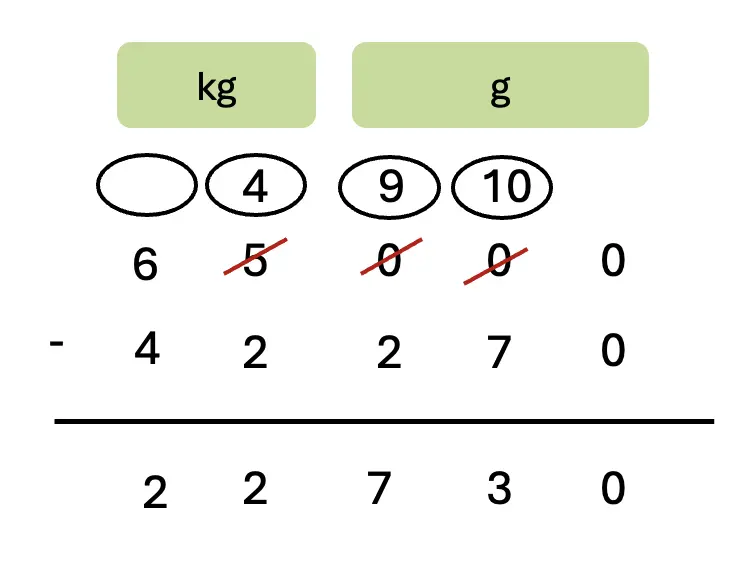
The quantity of flour left on the first day after usage = 22 kg 730 g.
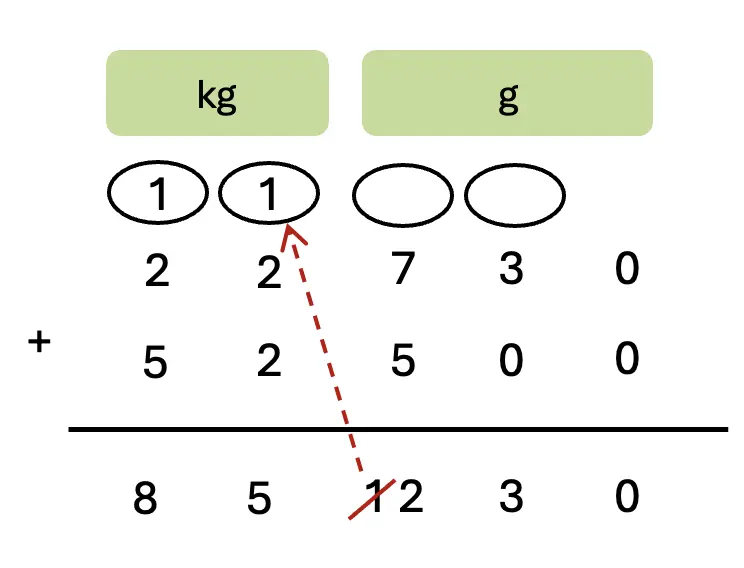
So, the total quantity of flour available in the kitchen store is 85 kg 230 g.
Textbook Page 112
Let Us Do
1. The cost of some grocery items is given in the following table. Find the total cost of each item.
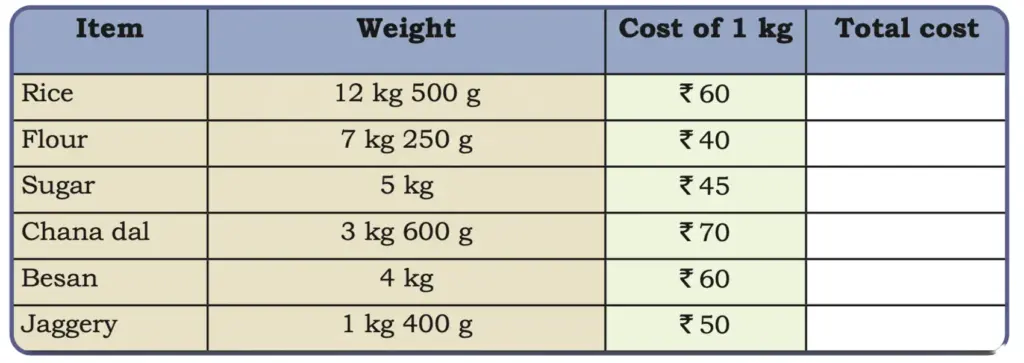
Solution:
(i) Rice:
Cost of 1 kg rice = ₹ 60.
Cost of 500 g rice = ₹ 60 ÷ 2 = ₹ 30.
Cost of 12 kg = ₹ 60 × 12 = ₹ 720.
Therefore, the total cost of 12 kg 500 g of rice = ₹ 720 + ₹ 30 = ₹ 750.
(ii) Flour:
Cost of 1 kg flour = ₹ 40.
Cost of 250 g flour = ₹ 40 ÷ 4 = ₹ 10.
Cost of 7 kg = ₹ 40 × 7 = ₹ 280.
Therefore, the total cost of 7 kg 250 g of flour = ₹ 280 + ₹ 10 = ₹ 290.
(iii) Sugar:
Cost of 1 kg sugar = ₹ 45.
Cost of 5 kg sugar = ₹ 45 × 5 = ₹ 225.
(iv) Chana Dal:
Cost of 1 kg dal = ₹ 70.
Cost of 100 g dal = ₹ 70 ÷ 10 = ₹ 7.
Cost of 600 g dal = ₹ 7 × 6 = ₹ 42.
Cost of 3 kg dal = ₹ 70 × 3 = ₹ 210.
Therefore, the total cost of 3 kg 600 g Channa Dal = ₹ 210 + ₹ 42 = ₹ 252.
(v) Besan:
Cost of 1 kg besan = ₹ 60.
Cost of 4 kg besan = ₹ 60 × 4 = ₹ 240.
(vi) Jaggery:
Cost of 1 kg jaggery = ₹ 50.
Cost of 100 g jaggery = ₹ 50 ÷ 5 = ₹ 5.
Cost of 400 g jaggery = ₹ 5 × 4 = ₹ 20.
Therefore, the total cost of 1kg 400 g jaggery = ₹ 50 + ₹ 20 = ₹ 70.
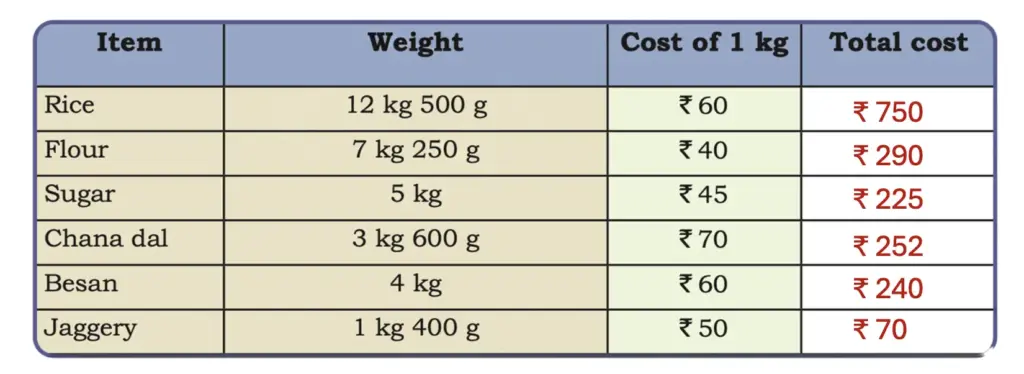
2. 4 people need 500 g rice for a meal. How much rice will be needed for 8 people if they eat similar quantity of rice?

Solution:

Textbook Page 113
3. 5 kg of tomatoes cost ₹ 73. How much will 10 kg of tomatoes cost?

Solution:

4. Nitesh is a scrap dealer. How much would he have paid for
(a) 16 kg of old newspaper, if he paid ₹ 8 for every 1 kg of newspaper?
(b) 20 kg iron, if he paid ₹ 200 for every 10 kg of iron?
(c) 10 kg plastic, if he paid ₹ 30 for 5 kg of plastic?
Make double number lines for answering (b) and (c).
Solution:
(a) Newspaper = 16 kg
Amount paid for old newspaper = ₹ 8 × 16 = ₹ 128.
(b)

Therefore, for 20 kg iron, the money paid would be ₹ 400.
(c)

Therefore, for 10 kg plastic, the money paid would be ₹ 60.
Measuring Capacity
1. You must have seen tea being prepared at your home. How much water and milk do we need to make 2 cups of tea?
Do we need 1 l of water to make 2 cups of tea?
Is 500 ml of water enough for 2 cups of tea?
Solution:
We need 200 ml of water and 200 ml of milk to make 2 cups of tea.
No, 1 l of water is far too much to make two cups of tea.
No, 500 ml of water is also too much for 2 cup of tea.
2. A bucket can hold a maximum of 20 ml of water. Is this statement correct? Which unit should be used in such a situation?
Solution:
The statement “A bucket can hold a maximum of 20 ml of water” is incorrect. The correct unit here is litres (L), not millilitres (ml).
Big to Small, Small to Big
1. Ramiz brings a 500 ml water bottle to school. He drinks two bottles at school. How much water does he drink at school? Ramiz drinks ___________ml + ___________ml = _________ml. Ramiz drinks ____ l of water in a day.
Solution:
Ramiz drinks 500 ml + 500 ml = 1000 ml.
Ramiz drinks 1 l of water in a day.
2. Muskaan drinks 3 l of water in a day. How many times would she need to refill a 500 ml water bottle? ________________. Muskaan drinks _________ ml of water in a day.
Solution:
3 l = 3 × 1000 = 3000 ml.
Number of times Muskan needs to refill her bottle = 3000 ml ÷ 500 ml = 6 times.
Muskaan drinks 3000 ml of water in a day.
Textbook Page 114
3. Write the total capacity of the following containers in each blank.
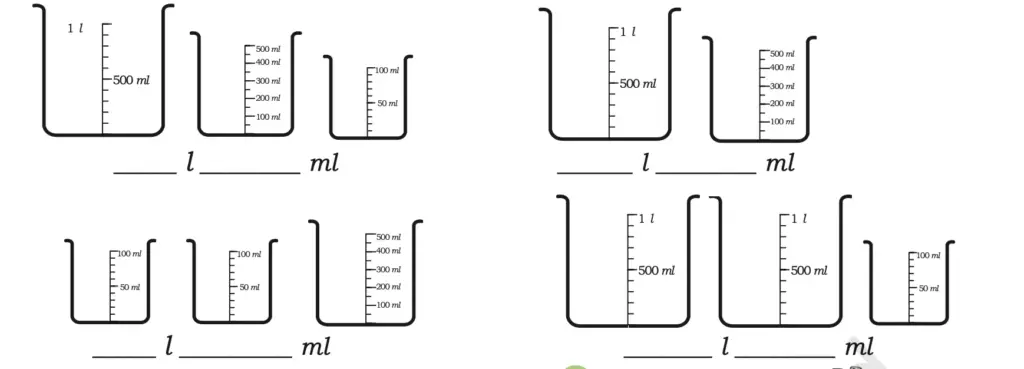
Solution:
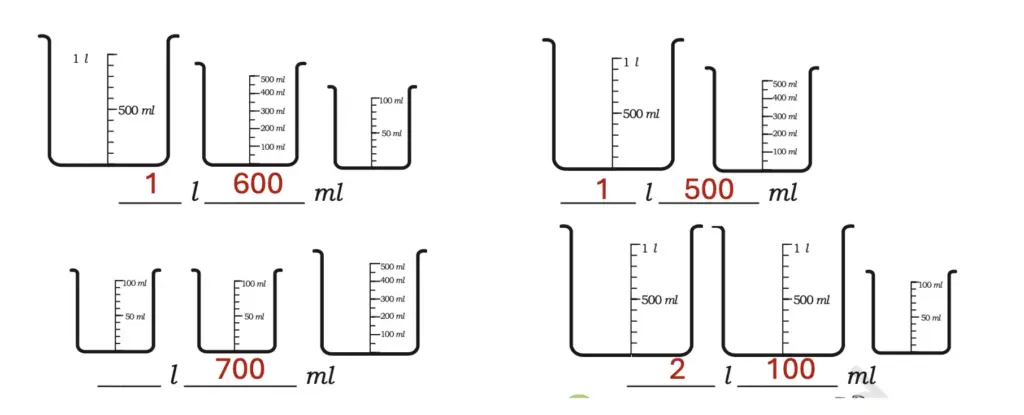
The Milkman’s Delivery
• Khayal chacha delivers fresh cow milk to homes. Bhalerao’s family orders 2l of milk every day.
This family has a vessel marked in ml only. What mark will you see in the vessel corresponding to 2 l ?
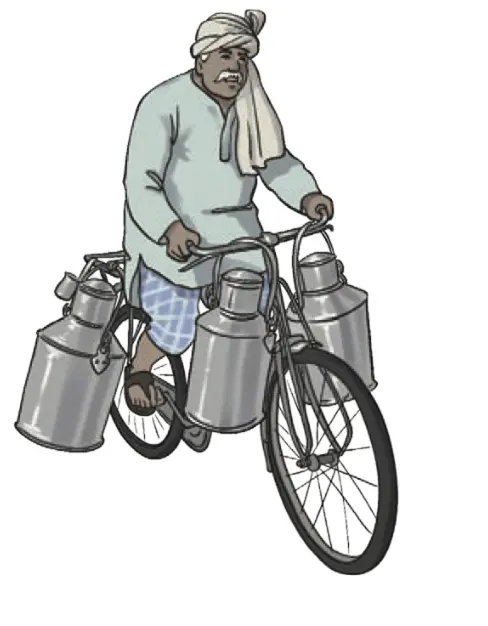
Solution:
The mark corresponding to 2 l in the vessel = 2 × 1000 ml = 2000 ml.
Q.

Solution:

• Khayal chacha delivers the following amounts of milk each week to different families.
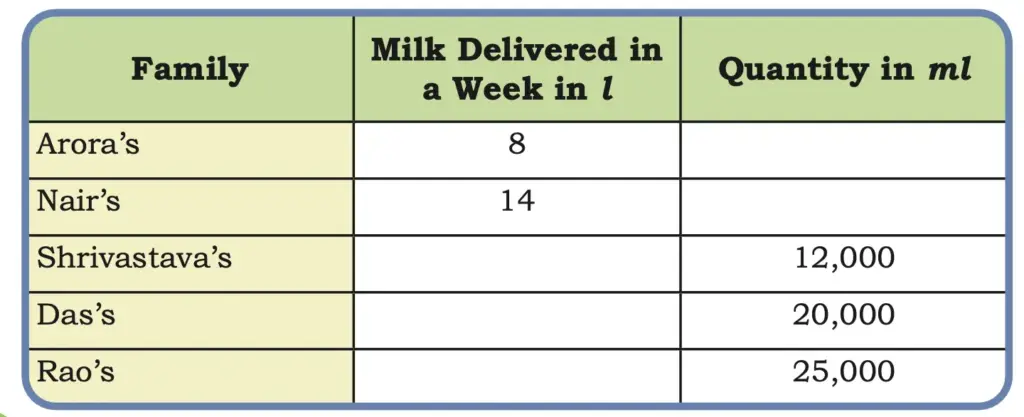
Solution:
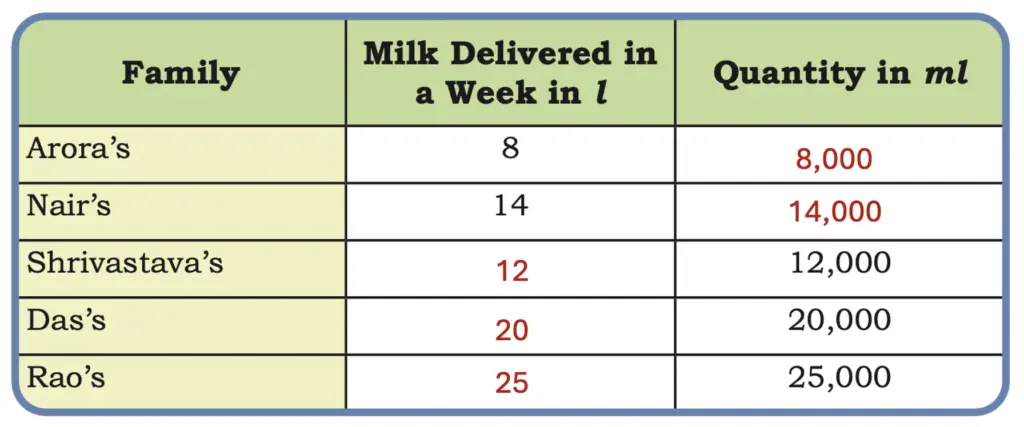
Textbook Page 115
Let Us Think
1. Mary and Daisy filled their bottle with 1l 400 ml of water. They wondered about the capacity of the bottle in ml. How much is it?
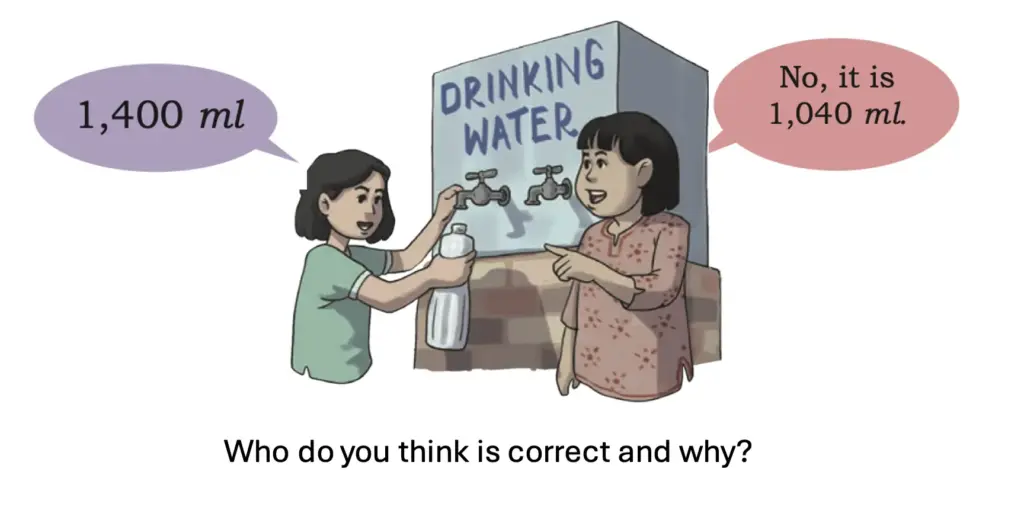
Solution:
Total capacity of Mary’s and Daisy’s bottles = 1 l 1400 ml = 1000 ml + 400 ml = 1400 ml.
Capacity of one bottle = 1400 ml ÷ 2 = 700 ml.
Since 1 l 400 ml = 1400 ml.
So, 1400 ml is the correct answer.
2. Convert and fill in the blanks appropriately. You can use the double number line given earlier.

Solution:
(a) 3 l 8 ml = 3 × 1000 ml + 8 ml = 3,000 ml + 8 ml = 3,008 ml.
(b) 9 l 90 ml = 9 × 1000 ml + 90 ml = 9,000 ml + 90 ml = 9,090 ml.
(c) 14,075 ml = 14,000 ml + 75 ml = 14 × 1000 ml + 75 ml = 14 l + 75 ml = 14 l 75 ml.
(d) 8 l 86 ml = 8 × 1000 ml + 86 ml = 8,000 ml + 86 ml = 8,086 ml.
(e) 12,200 ml = 12,000 ml + 200 ml = 12 × 1000 ml + 200 ml = 12 l + 200 ml = 12 l 200 ml.
(f) 18,350 ml = 18,000 ml + 350 ml = 18 × 1000 ml + 350 ml = 18 l + 350 ml = 18 l 350 ml.
Let Us Compare
1. Kiran owns a petrol pump. She records the details of the sales of petrol in a day.
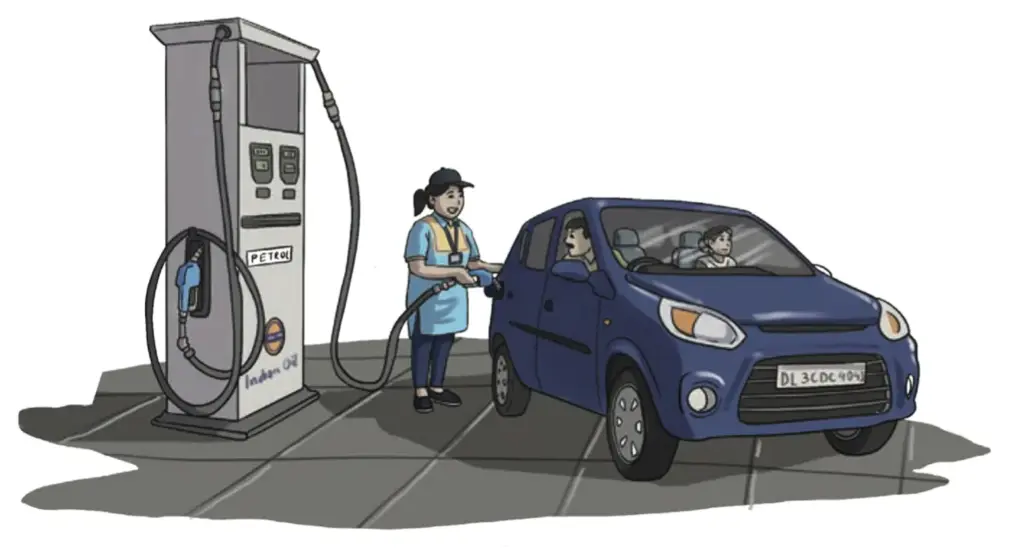
Textbook Page 116
2.
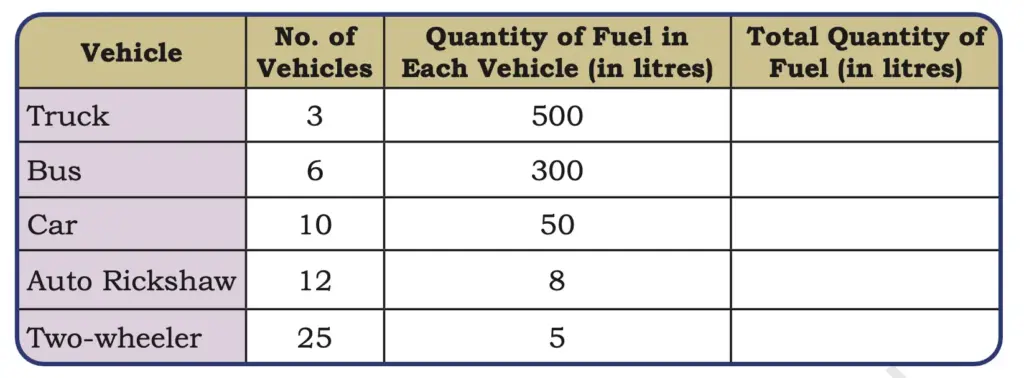
(a) How much more fuel is bought for buses than for trucks?
(b) What is the total quantity of fuel filled from the petrol pump on that day?
Solution:
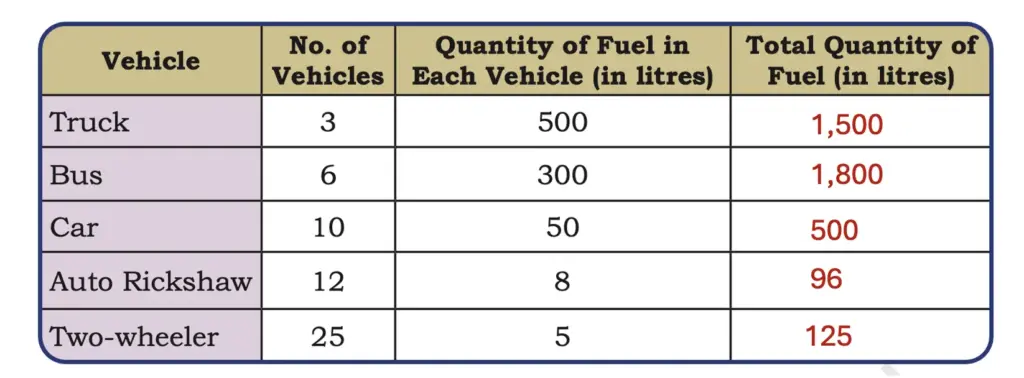
(a) 1,800 l – 1,500 l = 300 ml.
So, 300 ml more fuel is bought for buses than for trucks.
(b) Total quantity of fuel filled = 1,500 ml + 1,800 ml + 500 ml + 96 ml + 125 ml = 4,021 ml.
4,021 ml = 4,000 ml + 21 ml = 4 l 21 ml.
3. Compare the following quantities using the signs <, =, >.

Solution:
(a) 5 l 600 ml ________ 5,400 ml
5 × 1000 ml + 600 ml ________ 5,400 ml
5,000 ml + 600 ml ________ 5,400 ml
5,600 ml > 5,400 ml.
(b) 10 l 100 ml ________ 1 l 600 ml
10 × 1000 ml + 100 ml ________ 1,000 ml + 600 ml
10,000 ml + 100 ml ________ 1,600 ml
10,100 ml > 1,600 ml.
(c) 190 ml + 800 ml ________ 800 ml + 109 ml
990 ml > 909 ml.
(d) 3 l 600 ml ________ 3,600 ml
3 × 1000 ml + 600 ml ________ 3,600 ml
3,000 ml + 600 ml ________ 3,600 ml
3,600 ml = 3,600 ml.
(e) 4 l 50 ml ________ 4 l 500 ml
4 × 1000 ml + 50 ml ________ 4 × 1000 ml + 500 ml
4,000 ml + 50 ml ________ 4,000 ml + 500 ml
4,050 ml < 4,500 ml.
4. Sam and Tina fill petrol in their bikes. Tina bought 2 l 500 ml of petrol. Sam bought 2 l 800 ml more petrol than Tina. How much petrol did Sam buy?
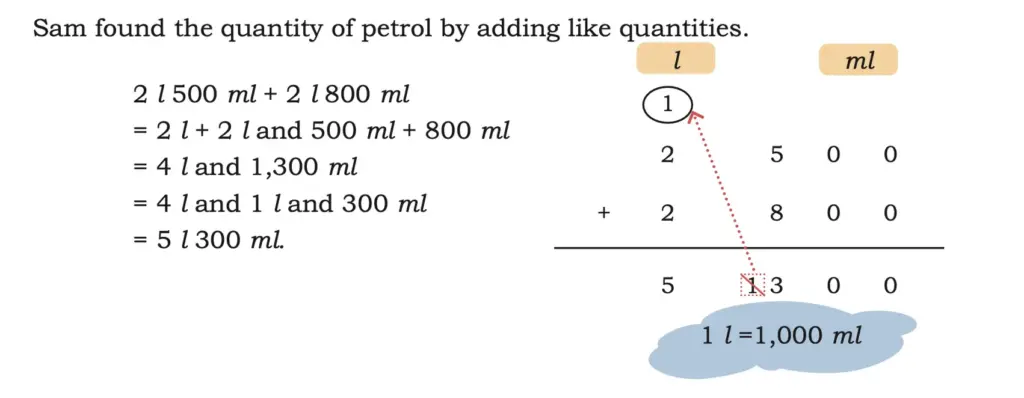
Textbook Page 118
1. Riya is filling water bottles for a picnic. She fills one 2 l bottle and four 500 ml bottles. Her friend, Aarav fills three 750 ml bottles. Who filled more water, Riya or Aarav? How much more?
Solution:
Water filled by Riya = 4 × 500 ml + 2 l
= 2,000 ml + 2 l
= 2 l + 2 l = 4 l.
Water filled by Aarav = 3 × 750 ml
= 2,250 ml = 2 l 250 ml.
So, Riya filled more water.
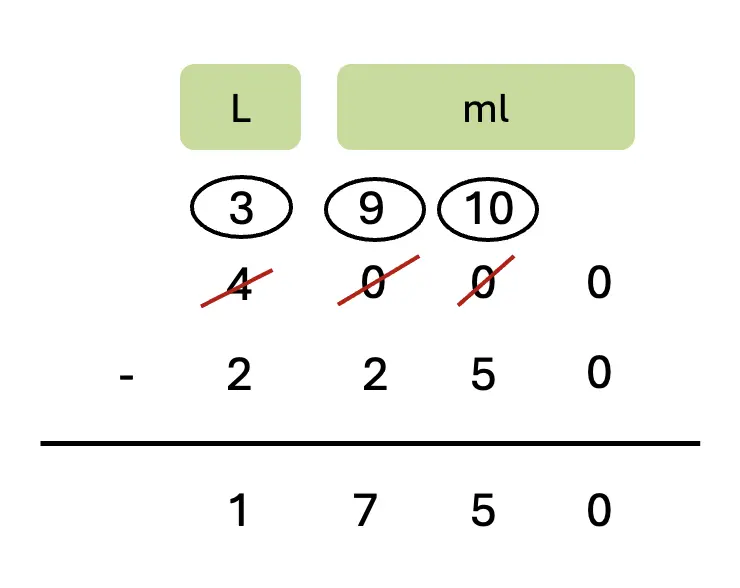
Thus, Riya filled more water than Aarav, by 1 L 750 ml.
2. A bottle of milk is poured equally into 8 glasses, leaving 120 ml of milk in the bottle.
(a) If each glass has a capacity of 360 ml, what is the total capacity of 8 glasses?
(b) How much milk was there in the bottle initially?
(c) If 1 l of milk costs ₹ 40, how much will 3 l milk cost?
Solution:
(a) Capacity of 8 glasses = 8 × 360 ml = 2,880 ml = 2 l 880 ml.
(b) Milk present in the bottle initially = Milk poured in 8 glasses + Milk left in the bottle
= 2,880 ml + 120 ml
= 3,000 ml = 3 l.
(c)

So, 3 l milk will cost ₹ 120.
3. A juice vendor has a 5 l container of orange juice. Each glass has a capacity 250 ml.
(a) How many full glasses can he serve before the container becomes empty?
(b) If he has already served 10 glasses, how much juice is left?
(c) If 250 ml of juice is sold at ₹ 25, how much will he earn by selling 5 l juice?
Solution:
(a) 250 ml × 4 = 1,000 ml = 1 l.

So, the total glasses that can be served is 20.
(b) Juice in 10 glasses = 10 × 250 ml = 2,500 ml = 2 l 500 ml.
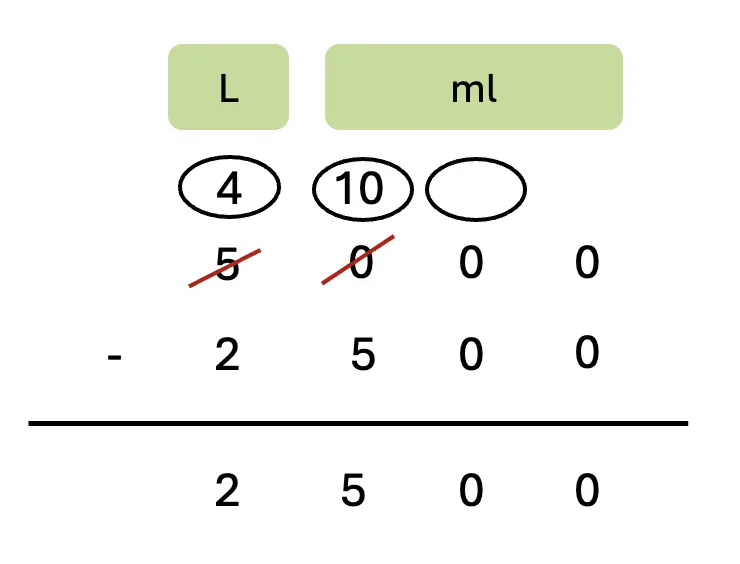
Therefore, juice left in the container is equal to 2 l 500 ml.
(c) As, 250 ml × 20 = 5000 ml = 5 l.

Therefore, money earned by selling 5 l juice is ₹ 500.
4. In a factory, 8 l 400 ml of oil needs to be equally poured into 7 containers for storage. How much oil will each container hold?
Solution:
Oil stored in each container = 8 l 400 ml ÷ 7
= 8,400 ml ÷ 7
= 1,200 ml = 1 l 200 ml.
Therefore, each container will hold 1 l 200 ml oil.
5. If one container can hold 1 l 75 ml of buttermilk, how much buttermilk will be there in 8 such containers?
Solution:
1 l 75 ml = 1,000 ml + 75 ml = 1,075 ml.
And 8 × 1,075 ml = 8,600 ml = 8 l 600 ml.

